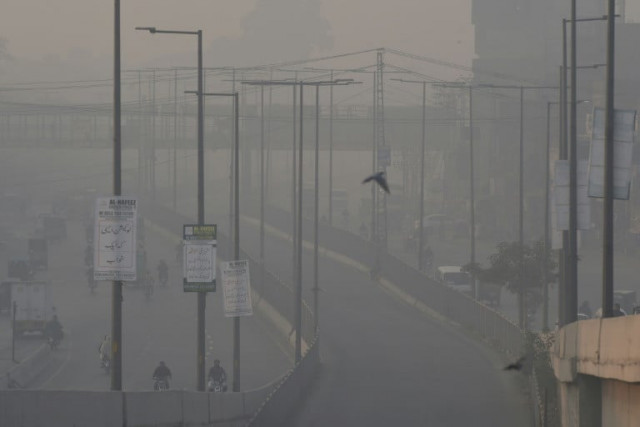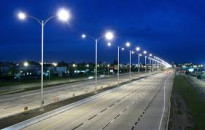Air pollution wraps city in choke-hold
Experts urge govt to take remedial action as respiratory diseases surge

Although Karachi may seem like a breath of fresh air in comparison to the current environmental conditions of Lahore, the coastal city is still faced with what is considered its worst air quality levels in a long time.
According to Mehmood Alam Khalid, President of Farozaan, a non-government organisation working locally for the protection of environment, Karachi is currently listed among the most polluted cities in the world. "A recent report of Inter-Governmental Panel on Climate Change warns that coastal cities of the world are expected to experience rise in sea level and face worst impacts of climate change. This also includes Karachi," the NGO president told.
Speaking in the regard, Muhamad Toheed, an urban planner, said that according to experts, temperature in Karachi this year was highest in last the 74 years. "Reports from some of the most reputable research institutes of the world have mentioned Karachi among cities directly affected by climate changes. About 70 percent of Karachi's population lives in slums and low-income areas, which suffer the most damaging impact of climate change," he added.
Different organisations monitor the city's air quality through an international application, IQ Air. Its readings deem pollution level in Karachi's air is almost 'unhealthy' and 'unhealthy for sensitive groups'. The monitor suggests that air quality level in city remained 167 US AQI on November 21 and is likely to remain between 113 US AQI to 148 US AQI during last five days of November.
In addition to that, high levels of compounds such as nitrogen dioxide (NO2) and sulfur dioxide (SO2) have also been making routine occurrence in the city's air. Nitrogen dioxide is of particular pertinence due to the large amount of it given off primarily by vehicles (as well as it being found in open burn sources and industrial emissions), so much so to the point that high levels of nitrogen dioxide in the air will often directly correlate with a large amount of traffic.
According to Green Pakistan Coalition's Yasir Hussain, air pollution levels in Karachi remain their highest at around 08:00 AM and 01:00 PM, on week days, mostly owing to school pick and drop timings and the number of vehicles on the road.
Read More: Are we overpredicting air pollution?
"It means millions of children are at risk twice in a day. Normally, Nagan Chowrani, Universiy Road, Sharea-e-Faisal, Bohrapir, M.A Jinnah Road, Bandar NIPA Chowrangi, Gulshan Chowrangi and such other spots remain most polluted throughout the year due to vehicular traffic. It is said that citizens of Karachi suffer serious health problems especially lungs diseases due to continued exposure to environmental pollution," he opined.
Supporting Hussain's rationale, Dr Ghafoor Shoro, a local pulmonologist, reiterated that air pollution can severely affect human lungs. "The infection starts from ear and nose and ultimately causes respiratory diseases, and in worst cases some patients can also develop conditions like tuberculosis, cancer and other serious diseases," he warned.
Speaking further, Dr Shoro said that currently, some 70 per cent of his daily visiting patients suffer from upper and lower respiratory infections due to change of whether.
Dr Shoro, who is also the General Secretary of Pakistan Medical Association (PMA), said that the PMA has expressed its concern about the situation at various times. "The relevant authorities of the government should take necessary measures for improving air quality to save lives of the people," he urged.
It is said that the lack of enforcement of environmental laws is the main reason for increased pollution in the city. Sindh government had made its own environmental laws after devolution of Environment Department along with other subjects from Federation to the provinces under 18th Constitutional Amendment. These laws were introduced through Sindh Environmental Protection Act, 2014.
Sindh Environmental Protection Agency (SEPA) was made responsible for implementation of these laws. Under the law no person can discharge or emit any effluent, waste, pollutant, noise or any other matter that may cause or likely to cause pollution or adverse environmental effects. According to Advocate Zubair Abro an important provision, Strategic Environmental Assessment (SEA), was also made part of the SEPA Act, 2014 but never implanted in Karachi.
Under the provision all provincial government agencies, departments, authorities, local councils and local authorities were bound to get Strategic Environment Assessment of their policies, legislation, plans and programmes for assessment of their environmental impact. "However, it was never implemented in Karachi. For example, Khaliquz Zaman Road was made commercial without conducting assessment of its environmental impact in the city under this provision," he told The Express Tribune.
The Express Tribune tried to contact SEPA Director General Naeem Ahmed Mughal for his comment on the matter, but he did not reply to the various telephone calls and text messages.
Published in The Express Tribune, November 27th, 2021.



















COMMENTS
Comments are moderated and generally will be posted if they are on-topic and not abusive.
For more information, please see our Comments FAQ